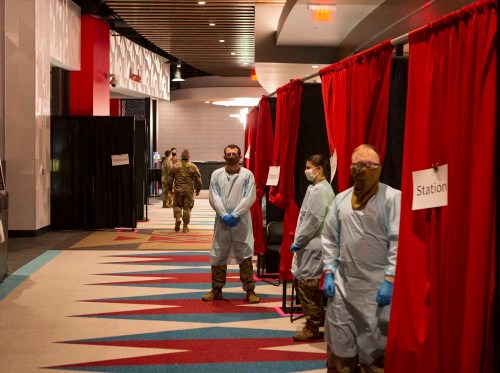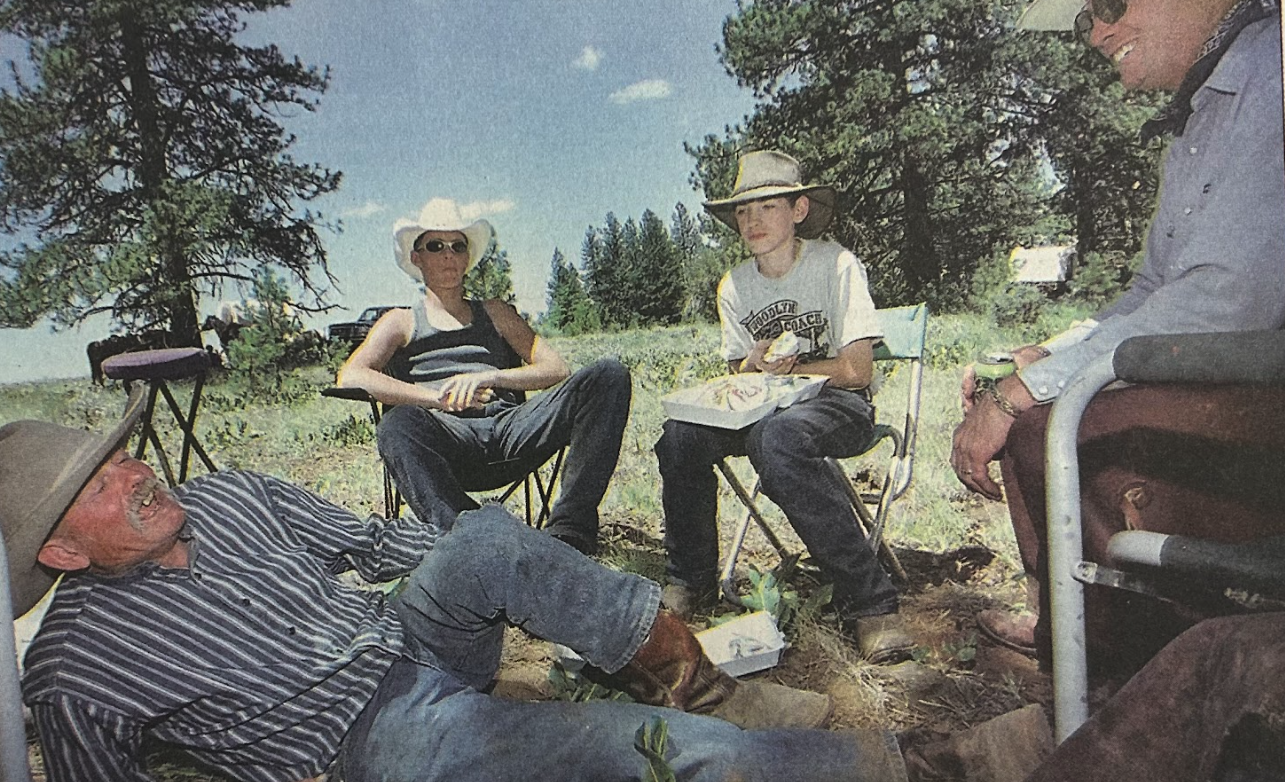Wildhorse vaccinations mark turning point for CTUIR
Published 6:00 am Tuesday, March 2, 2021

- Oregon National Guard members await their next patients during a COVID-19 vaccination clinic at Wildhorse Resort & Casino in Mission on Tuesday, Feb. 23, 2021.
MISSION — Since the COVID-19 vaccine was introduced late last year, there have been dozens of mass vaccination drives across the state. But the Confederated Tribes of the Umatilla Indian Reservation’s two-day vaccination event at Wildhorse Resort & Casino was likely the only one to begin with a Washat prayer.
On Tuesday, Feb. 23 and Wednesday, Feb. 24, Yellowhawk Tribal Health Center teamed up with the Oregon National Guard to vaccinate 932 people. Another 46 people were vaccinated using leftover doses after the event to push the total to 978.
But before needles met arms, Armand Minthorn, a member of the Tribes’ Board of Trustees and a spiritual leader, opened the day with a song.
“The song was a welcoming song that we do when we’re trying to bring in all the good light to an event,” Chuck Sams, the interim executive director of the CTUIR, said. “We wanted the room lit up bright with the good energy in order to provide the vaccine.”
Leaders believe the two-day period represents an important milestone for the Tribes. Once health care workers administer the second dose of the Pfizer vaccine later this month, everyone who lives, works or is enrolled with the Umatilla Indian Reservation that wants the vaccine will have received it.
The Wildhorse event marked the first time the Tribes were opening up their vaccine supply to non-Indians who live on the reservation or work for a tribal entity.
While tribal members were still eligible to receive the vaccine at Wildhorse, a two-day breakdown showed that 85% of those vaccinated were non-American Indians.
One of the factors enabling the CTUIR to take this vaccine moonshot was its decision to order its vaccines through the Indian Health Service, a division of the U.S. Department of Health and Human Services. Although the sovereignty of Oregon’s nine federally recognized tribes means they can tailor their own vaccine programs, the CTUIR was one of only two tribes who opted for the Indian Health Service over the Oregon Health Authority.
Tribal leaders credit their vaccine supply with allowing them to steadily vaccinate tribal members, identifying anyone who was willing to obtain the vaccine through the Tribes’ enrollment office.
When the CTUIR received a nearly 1,000-dose shipment, Yellowhawk CEO Lisa Guzman realized the Tribes would need to plan something larger than the weekly clinics they had been running.
The Tribes sent out postcards to non-tribal residents throughout the reservation, continuing to network even as the Wildhorse event started to vaccinate as many people with connections to the reservation as possible.
“All of those staff who were working are connected to a lot of folks in the community,” Guzman said. “So they would pick up the phone and say, ‘Is your family in here?’ And they would say, ‘Well, no.’ And we would say, ‘Well, get them in here.’”
By April, Sams and other tribal officials believe they can fully reopen their government and tribal enterprises, given the vaccination rates.
As the CTUIR looks to put the pandemic behind them, Sams credited the plans they had in place that blunted the impact of the virus.
As of Monday, March 1, only one tribal member has died from COVID-19, and despite the virus modifying how they operated, Wildhorse and other tribal enterprises have turned a profit during the pandemic.
“I think had we had a better plan countywide, we probably could have had more things open than we did,” he said. “And we were trying to demonstrate that over and over again, that it is possible if you have a strong developed plan.”
For the Tribes, it wasn’t just about protecting its economy, but also protecting a tribal membership that had previously been decimated in centuries past by epidemics spread through white settlers.
For the Oregon National Guard, this is the first time they assisted a tribal vaccination event and their first vaccination operation in Umatilla County, according to Maj. Heather Bashor, a public affairs officer with the Oregon National Guard.
For Guzman, having the National Guard there was another milestone for the tribes.
“When we roll out any kind of event in a tribal community, people have their own views on what tribal communities are about,” she said. “So for us to bring young National Guardsmen to help us and participate and be part of the tribal community and work with our tribal members or individuals from other federally recognized tribes, it breaks down barriers. It really does.”
[EDITOR’S NOTE: This story has been changed to reflect a correction. The Wildhorse vaccination event took place on Tuesday, Feb. 23 and Wednesday, Feb. 24.]






